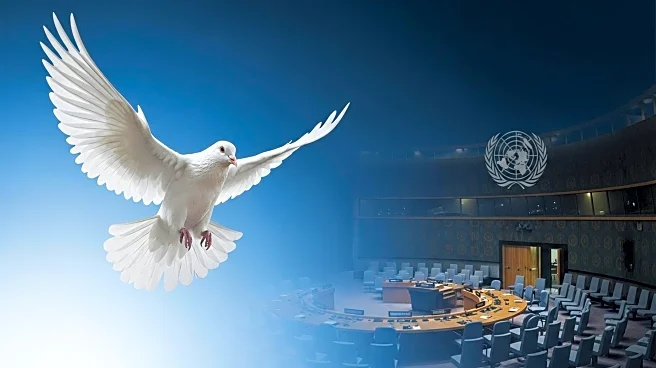What's Happening?
The United Nations Security Council is preparing to vote on a resolution calling for a ceasefire and increased humanitarian access to Gaza. This resolution, supported by a majority of the council, aims to address the ongoing humanitarian crisis in the region. The draft resolution demands an immediate, unconditional, and permanent ceasefire in Gaza, along with the release of hostages. Despite the support, the United States has consistently vetoed similar resolutions, backing its ally Israel. The US's stance has led to frustration among other council members, who feel their efforts to alleviate the suffering in Gaza are being undermined. The resolution comes after nearly two years of conflict in the Palestinian territory, with the UN officially declaring a famine in the region.
Why It's Important?
The resolution's significance lies in its potential to change the humanitarian situation in Gaza, which has been under severe strain due to ongoing conflict. If passed, it could lead to increased aid and relief for the Palestinian population. However, the US veto represents a significant obstacle, reflecting the geopolitical complexities surrounding the Israel-Palestine conflict. The US's support for Israel has been a longstanding policy, but it has drawn criticism from other international actors who argue that it hinders peace efforts. The resolution also highlights the growing frustration within the UN Security Council, as members seek to exert pressure on Israel to address humanitarian concerns.
What's Next?
The upcoming vote will test the resolve of the UN Security Council members in the face of US opposition. Should the resolution be vetoed again, it may lead to increased diplomatic tensions and calls for alternative approaches to address the crisis in Gaza. The issue is expected to be a focal point at the annual UN summit in New York, where international leaders will discuss potential solutions and the broader implications of the conflict. The ongoing humanitarian crisis in Gaza will likely continue to be a subject of international debate and advocacy.
Beyond the Headlines
The situation in Gaza raises broader questions about the effectiveness of international governance and the role of powerful nations in shaping global policy. The repeated US vetoes underscore the challenges faced by the UN in achieving consensus on contentious issues. This dynamic may prompt discussions on reforming the Security Council's veto power to better address humanitarian crises. Additionally, the accusations of genocide against Israel by a UN-mandated commission could have long-term implications for international law and accountability.










